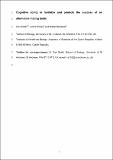Cognitive ability is heritable and predicts the success of an alternative mating tactic
Abstract
The ability to attract mates, acquire resources for reproduction, and successfully outcompete rivals for fertilisations may make demands on cognitive traits - the mechanisms by which an animal acquires, processes, stores, and acts upon information from its environment. Consequently, cognitive traits potentially undergo sexual selection in some mating systems. We investigated the role of cognitive traits on the reproductive performance of male rose bitterling (Rhodeus ocellatus), a freshwater fish with a complex mating system and alternative mating tactics. We quantified the learning accuracy of males and females in a spatial learning task and scored them for learning accuracy. Males were subsequently allowed to play the roles of a guarder and a sneaker in competitive mating trials, with reproductive success measured using paternity analysis. We detected a significant interaction between male mating role and learning accuracy on reproductive success, with the best performing males in maze trials showing greater reproductive success in a sneaker role than as a guarder. Using a cross-classified breeding design, learning accuracy was demonstrated to be heritable, with significant additive maternal and paternal effects. Our results imply that male cognitive traits may undergo intra-sexual selection.
Citation
Smith , C , Phillips , A & Reichard , M 2015 , ' Cognitive ability is heritable and predicts the success of an alternative mating tactic ' , Proceedings of the Royal Society B: Biological Sciences , vol. 282 , no. 1809 , 20151046 . https://doi.org/10.1098/rspb.2015.1046
Publication
Proceedings of the Royal Society B: Biological Sciences
Status
Peer reviewed
ISSN
0962-8452Type
Journal article
Description
The research was funded through the Czech Science Foundation 457 (P505/12/G112).Collections
Items in the St Andrews Research Repository are protected by copyright, with all rights reserved, unless otherwise indicated.

